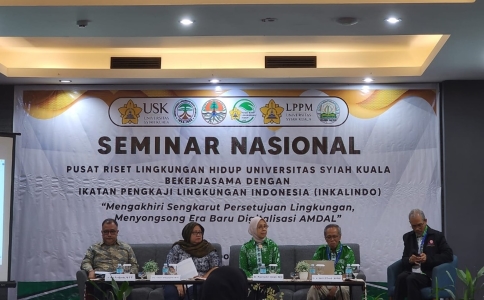Prof Hefni Effendi Provides Input on the Acceleration of Environmental Approvals

In order to accelerate the processing of environmental approvals or permits, the Ministry of Environment and Forestry has issued a number of policy steps in the form of establishing a ministerial regulation on accelerating environmental approvals and launching an environmental management digitalization system in the form of Amdalnet.
Prof Hefni Effendi as Head of the Department of Aquatic Resources Management (MSP), Faculty of Fisheries and Marine Sciences (FPIK) IPB University as well as the Supervisory Board of the Indonesian Association of Environmental Studies (Inkalindo) also provided input on accelerating environmental approvals which has become a hot topic today.
“The emergence of this accelerated effort was motivated by the accumulation of applications for environmental approval from a number of businesses/activities at the Directorate of Prevention of Environmental Impacts on Businesses and Activities (PDLUK), Ministry of Environment and Forestry (KLHK),” he said in a National Seminar entitled Ending Confusion over Environmental Approvals, Welcoming New Era of Digitalization of Amdal’ at Syiah Kuala University (Unsyiah), Banda Aceh.
The increase in applications has reached 10 times from around 108 applications to approximately 1127 applications by the end of 2022. This increase occurred after the enactment of the Job Creation Law and Government Regulation No 22 of 2021 concerning Implementation of Environmental Protection and Management.
The slowdown in the environmental approval process is felt equally by all business actors, both at the central and regional levels. Complaints about this slowdown were voiced by almost all business sectors and became material for discussion, both formal and non-formal.
“To unravel the buildup of these applications, the formulation and implementation of strategic steps is a necessity. It is hoped that the acceleration of environmental approvals, strengthened by the Minister of Environment and Forestry’s decision and the launch of the Amdalnet, is expected to solve these problems,” he said.
However, said Prof Hefni, socialization efforts and institutional strengthening are needed in the implementation of these two policies. The national seminar held by Inkalindo with Unsyiah is one of the efforts to socialize the policy of accelerating environmental approval and Amdalnet.
In his presentation, Prof Hefni Effendi reviewed the ‘Readiness and Enthusiasm of Stakeholders in Supporting the Amdalnet Application’. He conveyed several things including the compilation of complaints from initiators, the performance of Amdal commissions at the central and regional levels, the performance of the Compilation Service Provider Agency (LPJP) and the personal performance of the environmental document drafting team.
He added, the acceleration of environmental approvals was carried out through the assignment of a number of matters from the central Ministry of Environment and Forestry to the Regional Office of the Environment (DLH), one of which was an Environmental Impact Analysis (Amdal) assessment. Acceleration activities through assignments are carried out in 19 locations, namely 11 provinces, 4 cities and 4 districts covering 11 business sectors/activities.
“The policies that have been launched by the Ministry of Environment and Forestry have been and are being responded well by all stakeholders. A number of consultants and initiators have started implementing Amdalnet,” he said.
Apart from that, currently there have been coaching efforts regarding the use of Amdalnet. Province DLH and district/city DLH have implemented regulations regarding the acceleration of environmental approvals.
“Previously, consultants and initiators felt delayed in processing their environmental documents. However, after the Amdalnet and regulations regarding the acceleration of environmental permit approvals, they began to be enthusiastic about completing the pending environmental documents,” concluded Prof Hefni.
Also present at the meeting were Deputy Minister of Environment and Forestry, Head of the Environmental Standardization Agency (BSILHK), Director of Environmental Impact Prevention for Businesses and Activities (PDLUK) and General Chair of Inkalindo. The seminar, which was conducted in a hybrid manner, was attended by a number of DLHs throughout Indonesia. (HEF/Rz) (IAAS/BKU)
Sources: IPB News
